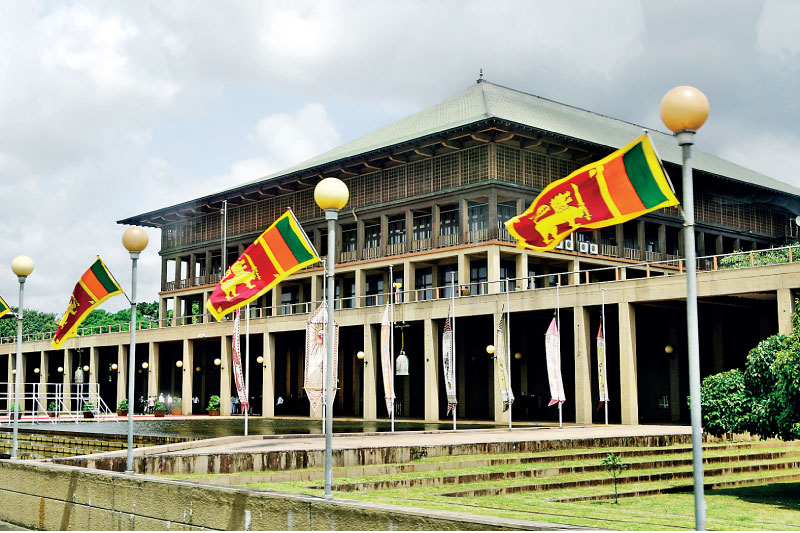Wednesday Feb 18, 2026
Wednesday Feb 18, 2026
Thursday, 7 October 2021 01:36 - - {{hitsCtrl.values.hits}}

The present Constitution embraces in substance, a feudalist character and embraces a master-slave relationship between the Government and citizens, instead of an agency-principal relationship in which the Government is limited and accountable for its action and inaction to the principal – Pic by Shehan Gunasekara
 The unfinished struggle for transformation is revealed every now and then in Sri Lanka and gets faded within a shorter period. However, the discussion between Victor and Mangala, published on paper titled ‘Agenda for transformation’ comes with an alarm signal of a failed state, and the same sentiment is shared by many writers that the country becoming a failed state is inevitable.
The unfinished struggle for transformation is revealed every now and then in Sri Lanka and gets faded within a shorter period. However, the discussion between Victor and Mangala, published on paper titled ‘Agenda for transformation’ comes with an alarm signal of a failed state, and the same sentiment is shared by many writers that the country becoming a failed state is inevitable.
Victor has come with a forward-looking paper to address the post-failed-state scenario and the proposal for reform. Waiting till becoming a failed state or awaking afterward will lead to further mess. A recent example is Tunisia which was ruled by dictators for decades and ended up as a failed state and the resulting constitutional reform was initially praised for the effort by many, but later ended up with constitutional deadlock.
The post-colonial constitution-making of many colonies went wrong, including Sri Lanka, as they failed to understand what kind of future system they need for and thus failed to manage the transition and colonial masters we set free to depart without any responsibility for their part of creating a feeble colony. Present Sri Lanka, once become a failed state, once more, the reform initiatives may go on to the hands of some, who are accidentally on the frontline at that time. But their direction of reform will be uncertain and therefore the forward-looking discussion proposed by Victor and Mangala is worthy to be continued at every level of the society.
The ‘agenda for transformation’ of Victor addresses two areas of reform: namely nation-building as principles for reform, and the various areas of the governance system that need to be reformed. The nation-building principles cover three themes, including ensuring equal rights and human dignity for all communities, and measures to abolish the feudal caste system that is rooted in majority communities, and bringing justice to the communities whose human rights are violated. While agreeing that these are the burning and divisive issues that need to be addressed, I am sceptical of the extent to which these notions will succeed in uniting all Sri Lankan communities towards the mission of nation-building.
Guaranteeing human rights for all and investigating the human rights violations of the past are generally seen as a matter associated with the minority communities, and human rights studies are also very limited, and only a handful of faculties at universities teach human rights subjects for the undergraduate and postgraduate courses. Likewise, the level of critical education provided by the education system and media do not sufficiently expose the feudal nature of the current system, or the prevailing destructive casts system, and therefore uniting the public under this notion will not be an easy task either. Hence, a new narrative to be explored which could mobilise all the communities together, and eventually make it possible, at a later stage, to address the three nation-building concepts mentioned by the article.
The second part of the article deals with the necessary reform on the governance and the state system and Victor highlights 16 areas of reform, that I would categorise into two broader sections namely constitutional reform framework and national policy development framework. The first section emphasises the need of an institutional arrangement to manage the constitutional reform project and identifies several focus areas of the constitution for reform such as the power of the head of state, the judiciary, the issue of sovereignty, and guaranteeing civil and political rights. The second section calls for the development and adoption of national policies, consistent with the constitutional rights, and special focus has been given to reform the state institutions such as media, education, health, election, key public officers, political parties, and politicians.
The author rightly mentioned the need for a ‘participatory constitution-making process in which the framers of the constitution, unlike the past, should not be limited to members of parliament, who inherently have a conflict of interest in many forms in undertaking the constitutional reform task, and instead, the constitution-making process should consist of a representative of the people organisations.
When the members of parliament, who are bound by party lines, being assigned to the task of ensuring the delicate balance and separation of power between executive, legislator, and judiciary, while they take part in legislative, and executive functions, inherently this arrangement provides all the comfort to dilute the strength of the judiciary and derail the delicate balance between the three wings of the government in their favour.
For example, Article 4 (3) of the Constitution states that the judicial power of the people shall be exercised by Parliament through courts and turbinal and Article 81(1) allows sitting judges of the court could be appointed by the head of the state to the special presidential commission to perform executive functions.
In addition, the author focuses on some other aspects of the constitution to be reformed such as limiting the head of the state below the law and providing power to the judiciary to scrutinise the executive and legislative actions and inactions eliminating the judiciary’s operational dependence on parliament in terms of fund allocation, as the Indian system, and restricting the amendments to fundamental rights are worthy to be considered in a future proposal.
However, I am sceptical of this abstract approach of reforming the Constitution as it happened in the past, we must move toward reforming the entire constitution holistically from its spirit, form, and its substance and I fully agree with Victor to go for a fresh constitution making process. The present Constitution embraces in substance, a feudalist character and embraces a master-slave relationship between the Government and citizens, instead of an agency-principal relationship in which the Government is limited and accountable for its action and inaction to the principal.
The present Constitution of Sri Lanka from the very beginning, right from the preamble speaks of two different classes and comprises of two paragraphs. The first paragraph states that the people entrusted, empowered and gave mandate and confidence to the elected representatives who are the executives and legislators to draft, adopt and operate a constitution, and the second paragraph states that the elected representative accepts the mandate given by the people. Apart from that, anything and everything mentioned in the preamble is subject to restrictions or limitations stipulated within the constitution. In substance, the living spirit of the constitution witnessed in its preamble is nothing but total and absolute submission of the people to the elected representative.
As a concluding remark of this response to Victor’s paper, I would like to say that we have to find a right notion that could bring all communities together in building a common future, and with regard to constitutional reform, I too agree with Victor that we need to go for a fresh start to form a new constitution, instead of looking for an ad-hoc opportunity to amend bits and pieces of the constitution.
(The writer holds an LLB London, MSc Liverpool, and is reading for LLM at the Faculty of Law in University of Colombo.)